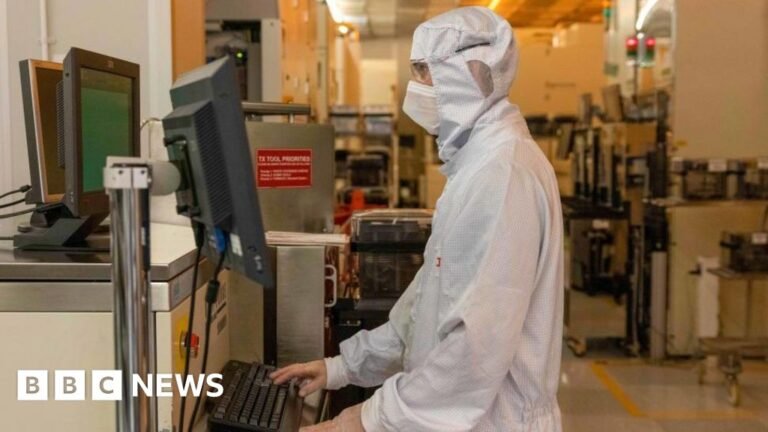
Contents
Dutch Government Takes Control of Chinese-Owned Chipmaker Nexperia to Safeguard European Semiconductor Supply
The Dutch government has taken control of Nexperia, a Chinese-owned chipmaker based in the Netherlands, citing “serious governance shortcomings” and aiming to protect Europe’s economic security and ensure the continuity of crucial technological knowledge and capabilities. The move is expected to raise tensions between the European Union and China, which have increased in recent months over trade and Beijing’s relationship with Russia. Nexperia’s owner, Wingtech, has stated that it will take actions to protect its rights and seek government support.
The Dutch government’s decision to take control of Nexperia, a leading Chinese-owned chipmaker, has sent shockwaves throughout the global semiconductor industry. On Monday, the Dutch Economic Ministry announced that it had invoked the Goods Availability Act, a highly exceptional measure, to intervene in Nexperia’s operations due to “acute signals of serious governance shortcomings” within the company. The ministry stated that these shortcomings posed a threat to the continuity and safeguarding of crucial technological knowledge and capabilities on Dutch and European soil, which could potentially risk Dutch and European economic security. The takeover is seen as a bid to safeguard the European supply of semiconductors for cars and other electronic goods, as well as to prevent the chips from becoming unavailable in an emergency.
Background and Context
The Dutch government’s decision to take control of Nexperia is not an isolated incident. In December 2024, the US government placed Wingtech, Nexperia’s parent company, on its so-called “entity list,” identifying the company as a national security concern. Under the regulations, US companies are barred from exporting American-made goods to businesses on the list unless they have special approval. Furthermore, in the UK, Nexperia was forced to sell its silicon chip plant in Newport after MPs and ministers expressed national security concerns. The company currently owns a UK facility in Stockport. These developments highlight the growing concerns among Western governments regarding the potential risks associated with Chinese-owned chipmakers and their impact on national security and economic stability.
Key Highlights and Implications
The Dutch government’s takeover of Nexperia has significant implications for the global semiconductor industry. Some key highlights and implications include:
* The Goods Availability Act is designed to allow the Hague to intervene in companies under exceptional circumstances, including threats to the country’s economic security and to ensure the supply of critical goods.
* Under the order, the Dutch Minister of Economic Affairs, Vincent Karremans, could reverse or block Nexperia’s decisions if they were potentially harmful to the company’s interests, to its future as a business in the Netherlands or Europe, or to ensure supply remains available in an emergency.
* The Dutch government has stated that Nexperia’s production can continue as normal, and the measure is intended to mitigate the risk of disruptions to the supply chain.
* Shanghai-listed shares in Nexperia’s parent company Wingtech fell by 10% on Monday morning, reflecting the market’s concerns about the potential impact of the takeover on the company’s operations and future prospects.
* Wingtech has stated that its operations are continuing uninterrupted and it remains in close communication with its suppliers and customers, despite the takeover.
Reactions and Responses
The takeover of Nexperia has sparked a range of reactions and responses from various stakeholders. Wingtech, Nexperia’s parent company, has stated that it will take actions to protect its rights and seek government support. A Nexperia spokesperson said that the company “complies with all existing laws and regulations, export controls and sanctions regimes,” and had no further comment. The Chinese embassies in the Netherlands and Brussels have also been contacted by the BBC for comment. The US government’s decision to place Wingtech on its entity list has also been seen as a factor contributing to the Dutch government’s decision to take control of Nexperia.
Quotes and Statements
Some notable quotes and statements regarding the takeover include:
* “These signals posed a threat to the continuity and safeguarding on Dutch and European soil of crucial technological knowledge and capabilities.” – Dutch Economic Ministry
* “Losing these capabilities could pose a risk to Dutch and European economic security.” – Dutch Economic Ministry
* “This measure is intended to mitigate that risk.” – Dutch Economic Ministry
* “We comply with all existing laws and regulations, export controls and sanctions regimes.” – Nexperia spokesperson
* “Our operations are continuing uninterrupted and we remain in close communication with our suppliers and customers.” – Wingtech statement
Conclusion and Future Prospects
The Dutch government’s takeover of Nexperia marks a significant development in the ongoing debate about the role of Chinese-owned chipmakers in the global semiconductor industry. As tensions between the European Union and China continue to rise, the takeover is likely to have far-reaching implications for the industry and the broader geopolitical landscape. The future prospects of Nexperia and Wingtech remain uncertain, as the companies navigate the complexities of the takeover and its potential impact on their operations and relationships with suppliers and customers.
Conclusion: The Dutch government’s decision to take control of Nexperia is a highly exceptional measure aimed at safeguarding European economic security and ensuring the continuity of crucial technological knowledge and capabilities. The takeover has significant implications for the global semiconductor industry and is likely to contribute to rising tensions between the European Union and China. As the situation continues to evolve, it remains to be seen how the takeover will impact the future prospects of Nexperia and Wingtech, as well as the broader industry and geopolitical landscape.
Keywords: Dutch government, Nexperia, Chinese-owned chipmaker, semiconductor industry, European economic security, Goods Availability Act, Wingtech, US government, entity list, national security concerns, UK facility, Stockport, Shanghai-listed shares, Vincent Karremans, Dutch Minister of Economic Affairs.
Hashtags: #DutchGovernment #Nexperia #ChineseOwnedChipmaker #SemiconductorIndustry #EuropeanEconomicSecurity #GoodsAvailabilityAct #Wingtech #USGovernment #EntityList #NationalSecurityConcerns #UKFacility #Stockport #ShanghaiListedShares #VincentKarremans #DutchMinisterOfEconomicAffairs
Source link